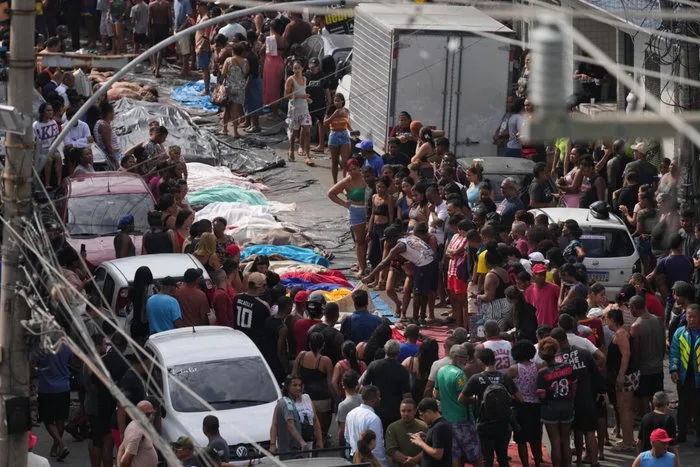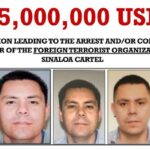By Chris Summers
Police in Rio de Janeiro recently carried out an operation in Alemao and Penha, two neighborhoods, or favelas, reportedly controlled by a huge gang called Comando Vermelho (CV).
The raids triggered gunbattles with the heavily armed gang, which led to the deaths of 121 people, including at least four police officers.
Favelas are poor neighborhoods, often characterized by densely-populated and shoddy housing, situated on hillsides in Rio de Janeiro, Brazil’s second biggest city.
On Aug. 28, Brazilian police and tax authorities seized 1.2 billion reais ($220 million) in assets they believe are owned by another of the country’s biggest organized crime groups, the Primeiro Comando da Capital (PCC) or First Capital Command, based in Sao Paulo.
“That is a sizable seizure, but it is only a fraction of PCC’s revenues,” Fergus Hodgson, publisher of the Impunity Observer and author of The Latin America Red Pill told The Epoch Times.
“This is a diversified organization that works with some of the world’s most important terrorist organizations.”
CV and PCC have grown at an alarming rate in recent years, and Brazilian organized crime is reaching the United States.
“So you’re going to see money laundering in the United States, and you’re going to see specific drug routes that have an indirect but significant impact on the United States,” said Jim Weber, a former narcotics investigator with the Department of Homeland Security and founder of St. Louis-based Streetwise Consulting.
“It is significant because Brazilian operations influence global drug prices.”
‘Enormous’ Profits
Edson Gomes, who runs Submundo Criminal, a social media venture which focuses on organized crime, said today’s Brazilian criminal groups are diversifying beyond drug trafficking. Gomes used a different name for safety reasons.
He told The Epoch Times that gangs such as CV and PPC were taking on activities that had previously been the preserve of milicias—groups of corrupt police officers—such as extortion of shopkeepers and favela residents, and the exploitation of water, gas, and internet services.
He pointed out that Pedro de Souza Mesquita, a senior officer with the Brazilian Intelligence Agency, told a parliamentary committee on Nov. 6 that CV is involved in all existing conflicts between criminal factions in Brazil.
“This demonstrates that groups like CV are becoming large, exploiting various criminal modalities, and inserting themselves into various layers of society,” Gomes said.
From 2008 onward, Pacifying Police Units (Unidades de Policia Pacificadora) have been sent into the favelas of Rio de Janeiro, in an effort to reclaim them from the gangs.
But Mesquita said the efforts had an unintended consequence, as it led to CV bosses moving to other parts of the country and thus increasing the group’s national reach.
“Gangs such as Comando Vermelho are aggressive, sophisticated, and well-equipped,” Hodgson said.
“That is because they work in lucrative black market sectors and have strong incentives to protect their turf.”
Active in Tri-Border Area
Hodgson said that gangs like PCC had found numerous ways to profit, including through smuggling in the tri-border area, near the frontiers with Argentina and Paraguay.
In May this year, the U.S. State Department said it was seeking information “leading to the disruption of the financial mechanisms” of the Iran-backed terror organization Hezbollah, specifically in the tri-border area.
PCC was probably responsible for an April 2017 heist in the city of Ciudad del Este, in the tri-border area, which involved up to 80 heavily armed robbers and led to a loss of up to $40 million, then-Paraguayan Interior Minister Lorenzo Lezcano told ABC.
Weber said the gangs are not necessarily too big to bring down but he said they are on “an upward trajectory.”
He said they appeared to be seeking to emulate the behavior of Mexican drug cartels, such as Sinaloa and Cartel de Jalisco Nueva Generacion (CJNG), which were designated as foreign terrorist organizations by the U.S. State Department in February.
The U.S. Drug Enforcement Administration’s latest cocaine report, published in July, said, “The predominant geographic source of Brazilian cocaine was Peru, followed by Bolivia.”
Both CV and PCC seem to be “incredibly powerful organizations,” but only in specific parts of Brazil, he said.
He said that Brazilians need to deal with them now before they get “out of control.”
“Look at Pablo Escobar,” Weber said. “He started out somewhat small, and then grew through just increasing the criminal activity, increasing the networking. That individual and his organization grew and grew and it wasn’t effectively addressed by law enforcement.”
Law enforcement, and particularly the police’s elite Special Police Operations Battalion (BOPE) force, are “trying to get a grasp on it so it doesn’t spread like wildfire throughout Brazil,” he said.
Gomes said the gangs impose terror on the favelas, often disguised by acts of apparent generosity such as giving toys to children on Children’s Day (Oct. 12) and other holidays.
“Recently, a friend informed me that in a favela where he lives in Rio de Janeiro, there was a war between gangs,” Gomes said.
“He said he was afraid to arrive home late from work because the gangs were watching everyone’s movements and even asked to search residents’ cell phones to check if any of them were in collusion with their rivals.
“Many residents are coerced into leaving their doors open so that the criminals can hide on days of police operations,” Gomes said.
High-Profile Airport Assassination
In November 2024, 38-year-old businessman Antonio Vinicius Lopes Gritzbach was assassinated outside the international airport in Brazil’s biggest city, Sao Paulo.
It has since emerged that Gritzbach was a PCC member who had been cooperating with Brazilian law enforcement, and had provided information about their money laundering operations and also implicated several corrupt police officers.
“Gritzbach had a target on his back for several years and knew it, but he didn’t care and continued to live his life normally,” Gomes said.
“This cost him dearly, and he paid with his life.”
He said several police officers who had been arrested for involvement in the case led “double lives,” and had contact with both Gritzbach and his tormentors.
Gomes said that the complicity of corrupt police officers could be one of the reasons factions such as PCC have grown so much in recent years.
“If anything, this case has brought the police–criminal association out of the shadows, after it was already widely assumed,” Hodgson said of the Gritzbach shooting.
Brazil’s Globo news outlet reported in March that among those indicted in connection with Gritzbach’s murder were Denis Antonio Martins, a corporal in the military police; Fernando Genauro, a police lieutenant; and Ruan Silva Rodrigues, a military police officer.
There is no hard evidence of widespread corruption in Brazil’s government or police forces, Weber said. But he added, “Let’s be real, that’s the way these organizations operate.”
“They seek individuals in law enforcement within that community that can benefit their criminal activity. Oftentimes, law enforcement is paid low, these organizations are very wealthy, and they can provide financial incentive to sources.”
CV, PCC, and two other organized crime groups—Terceiro Comando and Amigos dos Amigos—have deep roots in Brazil.
Founded By Political Prisoners
In the 1970s, CV was founded as Falange Vermelha by left-wing political prisoners during Brazil’s military dictatorship.
But its founder, Eduino Eustaquio de Araujo, known as Dudu da Rocinha, transformed it into a purely criminal organization long before he was murdered in a prison cell in 2013.
“It has morphed into a massive, very influential organization, and not just in Brazil, but it has ties throughout the world,” Weber said.
PCC was founded in the 1990s by Marcos Willians Herbas Camacho, known as Marcola and Playboy.
Now 57, he is serving a 232-year sentence in a maximum-security prison for homicide, drug trafficking, and robbery but is said to retain control of the gang on the outside.
His second in command, Gilberto Aparecido Dos Santos, known as Fuminho, was arrested in Mozambique in April 2020 and extradited to Brazil.
Gomes said there are an estimated 30,000 members in PCC, but that if associates are included, that number could triple.
Politicians Struggle to Combat Crime
Gomes said Brazilian President Luiz Inácio Lula da Silva’s views on crime differ significantly from his predecessor, Jair Bolsonaro, who supported aggressive police operations and the fight against drug trafficking.
“Lula has a position that is more about respecting human rights, intelligent policing without confrontation,” Gomes said.

“Crime takes advantage of this, even inserting itself into the local political scene to maintain a certain control,” Gomes said. “There are several cases of campaign financing and candidates heavily involved with factions.”
Brazil’s Senate has launched a commission of inquiry into organized crime, although Gomes said, “We don’t have high expectations for it.”
The next presidential election in Brazil is in October 2026 but Bolsonaro will not be a candidate. He was jailed for 27 years in September after being accused of instigating a coup after the 2022 election, and the trial was described as a “witch hunt” by Trump.
“These problems, especially the infiltration of police forces, run deeper than one presidential administration,” Hodgson said. “Assuming one or two simple policies could unravel organized crime would be foolish.”
He said that Lula had reduced the harshness of sentencing in drug cases, and Bolsonaro had made gun ownership easier.
“Most of Bolsonaro’s changes were reversed when Lula got back into power,” Hodgson said. “While the two presidents have somewhat different strategies towards organized crime, Brazil has a peculiar statist culture that has prevented deeper liberalization that would reduce gang power.”





